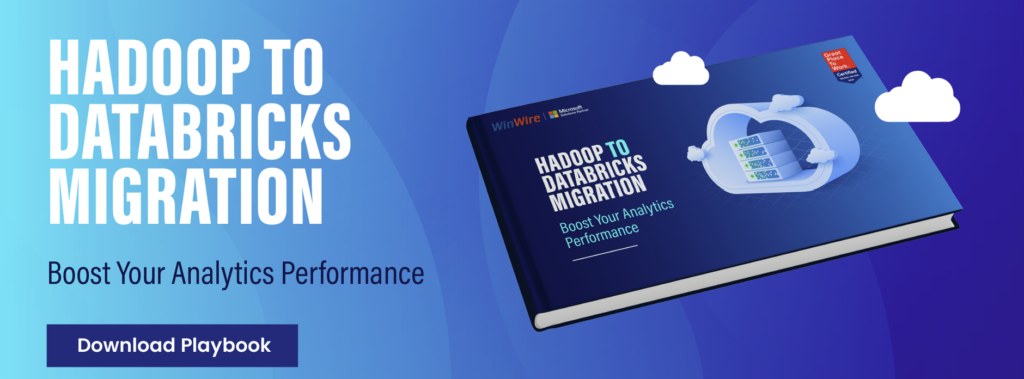
Introduction
Several companies that previously depended on Hadoop are now reevaluating their approaches to handling data. On-premises Hadoop systems frequently face problems such as inflated expenses, complicated setups, and performance limitations. Moreover, they fall short of providing the sophisticated data science tools needed for extracting high administrative overhead. As a result, many organizations are looking into alternative data solutions, including efficient and adaptable cloud-based platforms like the Databricks.
Why Migrate from Hadoop to Databricks on Azure
While Hadoop’s Distributed File System (HDFS) was a significant step forward in data storage, it doesn’t fully address the current needs of businesses. Here are several issues that organizations encounter with Hadoop:
- Increasing Scalability Costs: The cost of scaling Hadoop can become exorbitant as the amount of data increases, including high hardware and maintenance expenses.
- High Administrative Overhead: Significant IT resources are needed to handle the deployment and maintenance of Hadoop clusters.
- Complicated Data Processing: Using various tools leads to complex integration and slower processing times.
- Performance Issues: Achieving consistent, optimal performance is a challenge with Hadoop, particularly for varying workloads.
- Data Redundancy and Silos: Duplication of data storage and segregated pools of data arise with Hadoop, making analytics more complex.
- Analytical Integration Deficiencies: Hadoop faces difficulties in achieving seamless integration with contemporary analytics platforms.
- Governance Obstacles: It’s challenging and risky to implement data governance and access controls across separate data pools.
- Limited Skill Availability: There is a shortage of qualified professionals who can effectively manage Hadoop infrastructures.
Databricks: The Future of Data Platforms
Projected to achieve over 60% sales growth, reaching US$ 2.4 Billion by mid-2024, Databricks garners substantial customer confidence. Their impressive performance in Q1 2024 included 221 deals over $1 million. With a consistent R&D investment at 33% of revenue—significantly higher than the 19% average of its peers—Databricks also reported over $400 million annual revenue from their Data Intelligence Platform initiated in 2020. 1
Two primary data format standards exist in the industry: Delta Lake by Databricks, with 92% usage, and Iceberg by Snowflake. Databricks acquired Tabular, founded by Iceberg’s creators, for over $1 billion to align Project UniForm with both data formats, simplifying client storage decisions.
Clearly, the Databricks Data Intelligence Platform (DIP) offers a comprehensive, scalable, and robust platform for real-time, batch, and metadata-driven data processing that supports GenAI and AI-ML workloads.
Why Migrate Hadoop to Databricks on Azure Cloud?
1. Unified Governance: The Unity Catalog, announced as open-sourced at the 2024 Databricks Data+AI Summit, offers comprehensive AI governance, discovery, access control, lineage, data sharing, auditing, and monitoring. This multi-format, multi-engine, and multi-modal support ensures seamless data management across the enterprise.
2. Unified Services: Databricks introduced LakeFlow for data ingestion, transformation, and orchestration. The AI-powered AI/BI dashboard and Genie interface enhance the usability of AI and BI tools. Mosaic AI completes the stack, providing end-to-end data processing capabilities.
3. Unified Workspace: Databricks’ interactive notebooks allow data engineers, analysts, and scientists to collaborate in real time, promoting innovation while reducing operational expenses.
4. Lakehouse Architecture: This architecture blends the strengths of data lakes and warehouses, reducing data redundancy and improving SQL querying capabilities with Delta Lake SQL endpoints. It simplifies data management and accelerates analytics and AI workflows.
5. AI-Powered Insights: Databricks integrates advanced AI models within its ecosystem, enabling enterprises to derive deeper insights from their data. From predictive analytics to automated decision-making, the platform opens up numerous possibilities.
6. Cloud Integration: Effortless integration with services like Azure, AWS, and GCP enhances capabilities and user experience, simplifying the process for companies to capitalize on their current cloud infrastructure.
Hadoop to Databricks – Migration Process
Consider these seven key areas when migrating from Hadoop to Databricks:
1. Migration Scope: Decide what needs migrating—data models, processing functions, interfaces, etc.
2. Automation: Use tools to speed up migration and reduce risk.
3. Planning: Understand your current Hadoop setup to avoid issues.
4. Business Data Knowledge: Train your team on business data to reduce reliance on SMEs.
5. Change Adoption: Educate teams about the new platform to handle changes effectively.
6. Network & Security: Ensure compliance and data security are addressed beforehand.
7. Microsoft CAF: Follow the Cloud Adoption Framework for best practices.

Migrating from Hadoop to Databricks Lakehouse Platform offers a path to overcoming the limitations of traditional Hadoop systems. With its unified governance, comprehensive services, collaborative workspace, and advanced AI integration, Databricks provides a modern, efficient, and scalable solution for today’s data-driven enterprises. As businesses continue to evolve, embracing a platform like Databricks can unlock new levels of insight, innovation, and operational efficiency.
Hadoop to Databricks – Case Study
WinWire assisted a prominent American software corporation in cutting the time for their Hadoop to Azure transition by 50%, anticipating annual cloud cost savings of around $3 million through WinWire’s proprietary Cloud Cost Optimization Platform. Read the complete story.
What’s Next?
WinWire’s Migration as a Service (MaaS) helps move Hadoop workloads to Azure Databricks, providing cost efficiency, critical insights, and comprehensive security. The unified Spark-based Databricks platform helps prepare your business to meet future challenges with reduced CAPEX and fresh analytical insights.
Hadoop to Azure Databricks : 2 Week Assessment
Our Hadoop to Azure Databricks Assessment offers a quick and comprehensive evaluation of your current Hadoop environment, providing a tailored migration strategy to seamlessly transition to Azure Databricks. Learn more.
Looking to enhance your Data Operations? Discover why migrating from Hadoop to Databricks can enhance your data strategy with improved performance, scalability, and AI integration. Learn how to make the switch smoothly.
Contact us to start your seamless migration now!







